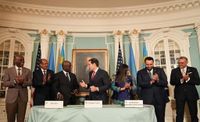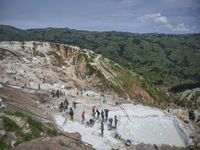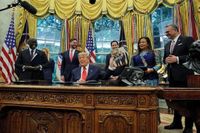On August 13, 2025, the United States government announced sweeping sanctions targeting armed groups and companies accused of fueling violence and profiting from illegal mining in the mineral-rich eastern region of the Democratic Republic of the Congo (DRC). The move, coordinated by the Treasury Department’s Office of Foreign Assets Control (OFAC), is the latest salvo in a long-running effort to curb the trade in conflict minerals that has plagued the region for decades.
The sanctions specifically target four entities: the armed group PARECO-FF, the Congolese mining cooperative Cooperative des Artisanaux Miniers du Congo (CDMC), and two Hong Kong-based exporters, East Rise Corporation Limited and Star Dragon Corporation Limited. According to officials, these groups and companies have been deeply implicated in the exploitation of critical minerals—such as tantalum, gold, cobalt, copper, and lithium—through means that include forced labor, violence against civilians, and widespread smuggling operations.
“The conflict minerals trade is exacting a deadly toll on Congolese civilians, fueling corruption, and preventing law-abiding businesses from investing in the DRC,” said John K. Hurley, Under Secretary of the Treasury for Terrorism and Financial Intelligence, in a statement reported by multiple sources including Reuters and AP. Hurley’s words underscore the human cost of the illicit minerals trade, which has contributed to thousands of civilian deaths and a mass displacement crisis in the eastern DRC.
The sanctions, imposed under Executive Order 13413, bar all U.S. entities and individuals from conducting business with the designated groups and companies. In addition, any U.S.-linked assets belonging to these entities will be frozen, effectively cutting them off from global financial systems that rely on American connections. The measures are designed to punish actors destabilizing the region and to send a strong message that the U.S. will not tolerate activities that undermine peace, stability, or security in the DRC.
At the heart of the sanctions is Rubaya, a vast mining area in eastern Congo renowned for its rich deposits of tantalum ore—a mineral vital for the production of electronics. Rubaya has long been a flashpoint in the region’s ongoing instability, with control over its lucrative mines shifting between various armed factions. According to the U.S. Treasury, PARECO-FF and its predecessor factions oversaw mining operations in Rubaya between 2022 and early 2024, collecting illegal fees and taxes, imposing forced labor, and executing civilians in their quest for profit. The CDMC, meanwhile, is accused of selling minerals smuggled from areas under PARECO-FF’s control, while East Rise and Star Dragon allegedly purchased those minerals for export to international markets, often through Rwanda.
The U.S. action comes amid a backdrop of renewed violence and political maneuvering in the Great Lakes region. The M23 rebel group, which is backed by Rwanda and has been designated by both the U.S. and United Nations for human rights abuses, currently controls Rubaya. M23’s resurgence has escalated the humanitarian crisis, leading to fresh waves of displacement and civilian suffering. On the very day the sanctions were announced, both sides of the conflict traded accusations of breaking a fragile ceasefire, each blaming the other for renewed attacks.
Despite these challenges, U.S. officials remain committed to supporting peace and prosperity in the region. In June 2025, the United States successfully brokered a peace accord between the DRC and Rwanda, aimed at ending fighting and securing access for American companies to the DRC’s critical minerals. As reported by the Associated Press, a permanent peace agreement between the DRC and M23 is slated for signing by August 18, though ongoing clashes threaten to undermine the deal. The U.S.-mediated Regional Economic Integration Framework, involving both the DRC and Rwanda, seeks to expand trade and investment, enhance transparency in mineral supply chains, and pave the way for responsible, legal investment in the region’s mining sector.
“The Treasury Department will not hesitate to take action against groups that deny the United States and our allies access to the critical minerals vital for our national defense,” Hurley emphasized. The statement reflects not only humanitarian and ethical concerns but also the strategic importance of the DRC’s mineral wealth to the global economy and U.S. security interests. Tantalum, cobalt, and lithium are essential components in everything from smartphones to electric vehicle batteries, making control over these resources a matter of intense international competition.
The sanctions are also intended to support a mining sector that contributes to lasting stability and economic development in the Great Lakes region. “The U.S. government will continue to take action to support a mining sector that contributes to lasting stability and economic development in the Great Lakes region and secure, reliable global critical minerals supply chains,” the State Department said in a separate statement.
For years, the eastern DRC has been caught in a vicious cycle of violence, corruption, and exploitation, with armed groups and complicit companies siphoning off mineral wealth at the expense of local communities. The latest U.S. sanctions are part of a broader strategy to break this cycle by cutting off the financial lifelines that sustain these groups and by promoting legal, transparent, and responsible investment. The hope is that, with the right diplomatic and economic incentives, the region can move toward a more peaceful and prosperous future.
Still, the path forward remains uncertain. The upcoming peace agreement between the DRC and M23 hangs in the balance, with both sides accusing each other of violating the ceasefire even as the ink on the accord has barely dried. Meanwhile, the humanitarian situation on the ground continues to deteriorate, with civilians bearing the brunt of the conflict and instability.
As the international community watches closely, the United States’ latest actions send a clear message: those who profit from violence and illegal mining in the DRC will face real consequences. Whether these measures will succeed in curbing the exploitation of conflict minerals and fostering lasting peace remains to be seen—but for now, Washington appears determined to keep up the pressure and to stand by the people of eastern Congo in their long struggle for justice and stability.



